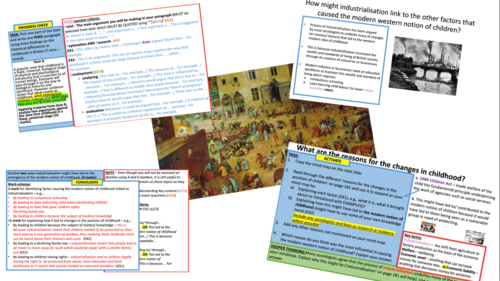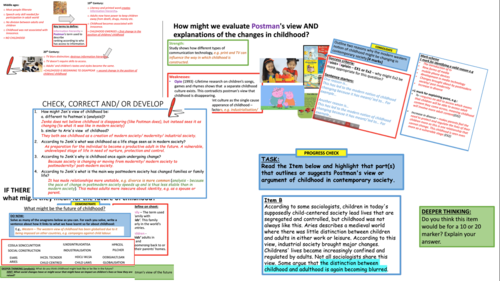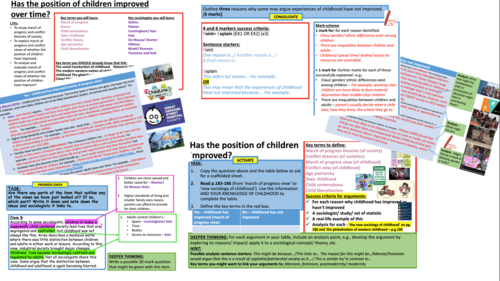
111Uploads
12k+Views
3k+Downloads
All resources

A-level AQA Families Topic 2 Childhood– The historical differences in childhood
Detailed and differentiated student-led lesson that explores Pre-industrial society, Industrialisation, Modern western notion of childhood, ‘cult of childhood’, Child-centredness/centred society , Infant mortality, as a way to examine Aries views and explanations of the historical differences in western childhood.
Activities require pages from the AQA A Level Sociology Book One Including AS Level: Book one 3rd Revised edition by Rob Webb, Hal Westergaard, Keith Trobe, Annie Townend
RESOURCES CAN BE FOUND AT THE END OF PPT
STUDENT-FRIENDLY MARK-SCHEME INCLUDED FOR 4 MARKER

A-level AQA Families Topic 2 Childhood– The future of childhood
Detailed and differentiated student-led lesson that explores Information hierarchy , Postmodernity/ postmodern society/ contemporary society, Modernity/ modern society/ industrial society, Accordion family, Boomerang children as a way to examine the changes to the modern western notion of childhood in contemporary society. Covers the views of Postman and Jenks.
Activities require pages from the AQA A Level Sociology Book One Including AS Level: Book one 3rd Revised edition by Rob Webb, Hal Westergaard, Keith Trobe, Annie Townend
RESOURCES CAN BE FOUND AT THE END OF PPT
ANSWERS INCLUDED FOR MAIN ACTIVITIES
**INCLUDES EXAM QUESTIONS **

A-level AQA Families Topic 2 Childhood- Has the position of children improved over time?
Detailed and differentiated student-led lesson that explores march of progress theory, Toxic childhood, Conflict theory, Age patriarchy, Child liberationism as a way to examine the different views (march of progress and conflict views) of whether childhood has improved over time. Includes views of Gittins, Palmer, Firestone and Holt, Aries etc.
Main activity requires pages from the AQA A Level Sociology Book One Including AS Level: Book one 3rd Revised edition by Rob Webb, Hal Westergaard, Keith Trobe, Annie Townend
ANSWERS INCLUDED FOR MAIN ACTIVIES
RESOURCES CAN BE FOUND AT THE END OF PPT

KEY SOCIOLOGIST SHEET - AQA A-level Sociology Education: Topic 3 Ethnic differences in achievement
Alphabetical list of sociologists who attempt to explain ethnic differences in achievement. SOME scaffolding with some sentence starters, prompts to help students with what some sociologists might says and put into external vs internal factors categories .
Requires students to write done what key sociologists from the topic ethnic differences in achievement (external and internal factors).
Good form of revision and revision resource for the students.
**BASED ON CONTENT in textbook - AQA A Level Sociology Book One Including AS Level: Book one 3rd Revised edition by Rob Webb, Hal Westergaard, Keith Trobe, Annie Townend ’ textbook

AQA A-level Sociology -Developing AO3 skills - Explicit criticisms and explained analysis
Detailed student led lesson on what is meant by explicit (vs juxtaposed) criticisms and explained analysis and how to demonstrate these high level AO3 skills needed for A*-A answers for AQA exams. The lesson is adapted to stretch and challenge the most able whilst scaffolding to allow pupils who need support the opportunity to access higher level thinking.
INCLUDES:
SIX MODEL PARAGRAPHS- from theory and methods (postmodernism and Marxism), methods in context, crime (punishment), media and family. THOSE WHO DO NOT TEACH FAMILY OR MEDIA will have 4 model paragraphs in total)
ANSWERS FOR ACTIVITIES
AfL
A 7 page information sheet on explicit criticisms and explained analysis from the skills booklets (can be bought separately - includes other guidance and skills for preparing for exams) that explain the two different skills, success criteria with sentence starters of how to demonstrate each and provides brief examples (of explicit criticisms, juxtaposed criticisms, explained analysis, analysis that is limited to an isolated statement). Also includes analysis guidance and sentence starters for research methods paragraphs and guidance of how students might go even further by explaining their criticisms.
**NOTE **- Activity on slide 8 is challenging. If students struggle too much with it, show answers on slide 9 and move onto the progress check activity that will make clearer how explicit criticisms are written.
**NOTE ** -The focus of evaluations are criticisms for this lesson
RESOURCES CAN BE FOUND AT THE END OF THE PPT (AND INFO SHEET FROM SKILLS BOOKLET IS ATTACHED AS A WORD DOC)

AQA A-level Sociology Education Topic 5 Role of education - Functionalist view
Detailed student led lesson on functionalist views of the role of education adapted to stretch and challenge the most able whilst scaffolding to allow pupils who need support the opportunity to access higher level thinking.
Covers the following functionalist key functions of education: installing social solidarity, bridging the gap between the family and wider society through secondary socialisation, teaching specialist skills needed for work and role allocation.
Covers the following functionalist sociologists: Durkheim, Parsons and Davis and Moore.
Covers the following key term:
Function or role (e.g. of an institution)
Social solidarity
Formal curriculum
Hidden curriculum
Ascribed status
Achieved status
Universalistic standards
Particularistic standards
Meritocracy
Socialisation
Role allocation
Promotes a spiral curriculum by making links to key terms that students might have previously been taught that link to this lesson.
Promotes, facilitates and scaffolds Oracy.
Develops the skills needed to answer 10 markers with items - allows students to apply knowledge to an item 10 marker with guidance and includes a detailed success criteria to help them answer this.
Uses and refers to ’ AQA A Level Sociology Book One Including AS Level: Book one 3rd Revised edition by Rob Webb, Hal Westergaard, Keith Trobe, Annie Townend ’ textbook
DETAILED ANSWERS INCLUDED FOR MAIN ACTIVITIES
NOTES -RESOURCES CAN BE FOUND AT THE END OF THE PPT.

AQA A-level Sociology Education Topic 5 Role of education - Marxist view
Detailed student led lesson on the Marxist views of the role of education adapted to stretch and challenge the most able whilst scaffolding to allow pupils who need support the opportunity to access higher level thinking.
Covers the following Marxist key functions of education: reproducing class ienquality, legitimising class inequality, correspondence principle,
Covers the following functionalist sociologists: Althusser, Bowles and Gintis and Willis
Covers the following key term:
State apparatuses
Ideological state apparatuses
Repressive state apparatuses
Ideology
Correspondence principle
Hierarchy
Alienation
Fragmentation
Extrinsic reward
Competition
Promotes a spiral curriculum by making links to key terms that students might have previously been taught within the education unit and for Marxism as a theory that link to this lesson.
Makes links to methods in context 20 marker - provides scaffolding and possible questions that link to Willis’ study.
Promotes, facilitates and scaffolds Oracy.
Provides guidance for answering 4 markers.
Uses and refers to ’ AQA A Level Sociology Book One Including AS Level: Book one 3rd Revised edition by Rob Webb, Hal Westergaard, Keith Trobe, Annie Townend ’ textbook
DETAILED ANSWERS INCLUDED FOR THE MAIN ACTIVITIES ON THE FUNCTIONS OF EDUCATION ONLY
NOTES -RESOURCES CAN BE FOUND AT THE END OF THE PPT.

AQA A-level Sociology Education Topic 5 Role of education - The New Right view
Detailed student led lesson on the New Right critique and view of the purpose state education adapted to stretch and challenge the most able whilst scaffolding to allow pupils who need support the opportunity to access higher level thinking.
Covers the following key terms:
Neo-liberalism
The New Right
Conservatives
Voucher system
One-size-fits-all approach
League tables
Ofsted reports
National curriculum
Marketisation
Privatisation
Academies
Free schools
State schools
Social policies
Covers the following key sociologists: Chubb and Moe
Uses and refers to ’AQA A Level Sociology Book One Including AS Level: Book one 3rd Revised edition by Rob Webb, Hal Westergaard, Keith Trobe, Annie Townend ’ textbook
BRIEF ANSWERS TO THE MAIN ACTIVITY INCLUDED
NOTES -RESOURCES CAN BE FOUND AT THE END OF THE PPT.
Bundle

AQA A-level Sociology Education: Topic 5 The Role of education - Functionalist, Marxist and the New Right views
Includes: lessons on the functionalist, Marxist and the New Right view (see below for more detail) and key term sheet for the topic which can be set for home-learning or be filled out during the course of the lessons.
L1: Functionalist view of the role of education
Detailed student led lesson on functionalist views of the role of education adapted to stretch and challenge the most able whilst scaffolding to allow pupils who need support the opportunity to access higher level thinking.
Covers the following functionalist key functions of education: installing social solidarity, bridging the gap between the family and wider society through secondary socialisation, teaching specialist skills needed for work and role allocation.
Covers the following functionalist sociologists: Durkheim, Parsons and Davis and Moore.
Covers the following key term:
Function or role (e.g. of an institution)
Social solidarity
Formal curriculum
Hidden curriculum
Ascribed status
Achieved status
Universalistic standards
Particularistic standards
Meritocracy
Socialisation
Role allocation
Promotes a spiral curriculum by making links to key terms that students might have previously been taught that link to this lesson.
Promotes, facilitates and scaffolds Oracy.
Develops the skills needed to answer 10 markers with items - allows students to apply knowledge to an item 10 marker with guidance and includes a detailed success criteria to help them answer this.
Uses and refers to ’ AQA A Level Sociology Book One Including AS Level: Book one 3rd Revised edition by Rob Webb, Hal Westergaard, Keith Trobe, Annie Townend ’ textbook
DETAILED ANSWERS INCLUDED FOR MAIN ACTIVITIES
NOTES -RESOURCES CAN BE FOUND AT THE END OF THE PPT.
L2: Marxist view of the role of education
Detailed student led lesson on the Marxist views of the role of education adapted to stretch and challenge the most able whilst scaffolding to allow pupils who need support the opportunity to access higher level thinking.
Covers the following Marxist key functions of education: reproducing class ienquality, legitimising class inequality, correspondence principle,
Covers the following functionalist sociologists: Althusser, Bowles and Gintis and Willis
Covers the following key term:
State apparatuses
Ideological state apparatuses
Repressive state apparatuses
Ideology
Correspondence principle
Hierarchy
Alienation
Fragmentation
Extrinsic reward
Competition
Promotes a spiral curriculum by making links to key terms that students might have previously been taught within the education unit and for Marxism as a theory that link to this lesson.
Promotes, facilitates and scaffolds Oracy.
Provides guidance for answering 4 markers.
Uses and refers to ’ AQA A Level Sociology Book One Including AS Level: Book one 3rd Revised edition by Rob Webb, Hal Westergaard, Keith Trobe, Annie Townend ’ textbook
DETAILED ANSWERS INCLUDED FOR THE MAIN ACTIVITIES ON THE FUNCTIONS OF EDUCATION ONLY
NOTES -RESOURCES CAN BE FOUND AT THE END OF THE PPT.
L3: The New Right view of the role of education
Detailed student led lesson on the New Right critique and view of the purpose state education adapted to stretch and challenge the most able whilst scaffolding to allow pupils who need support the opportunity to access higher level thinking.
Covers the following key terms:
Neo-liberalism
The New Right
Conservatives
Voucher system
One-size-fits-all approach
League tables
Ofsted reports
National curriculum
Marketisation
Privatisation
Academies
Free schools
State schools
Social policies
Covers the following key sociologists: Chubb and Moe
Uses and refers to ’AQA A Level Sociology Book One Including AS Level: Book one 3rd Revised edition by Rob Webb, Hal Westergaard, Keith Trobe, Annie Townend ’ textbook
BRIEF ANSWERS TO THE MAIN ACTIVITY INCLUDED
NOTES -RESOURCES CAN BE FOUND AT THE END OF THE PPT.
Key term sheet for the role of education
Alphabetical key term sheet for AQA A-level Sociology Education Topic 5 Role of education that requires students to fill out the definitions themselves.
*** Includes some sentence starters to model to students how to incorporate key sociologists into their definitions. **
*** Key terms separated into Functionalist, New Right and Marxist key terms. **
*** Includes a section with key terms that students should know from previous learning (intro to sociological theories and topic 1-4 of education) that link to this topic. **
Good form of revision for students and can be used as a revision resource to develop AO1 once filled out.
**BASED ON CONTENT in textbook - AQA A Level Sociology Book One Including AS Level: Book one 3rd Revised edition by Rob Webb, Hal Westergaard, Keith Trobe, Annie Townend ’ textbook

AQA GCSE Sociology: Education -Alternative forms of education
Detailed student led lesson on the three main alternatives to formal education (home, democratic or de-schooling and vocational), their main features, how learning takes place within them an the advantages and disadvantages of each. Lesson has been planned to stretch and challenge the most able and included scaffolding to support all pupils with meeting the lesson objectives.
Encourages and scaffolds oracy skills whilst allowing students to form their own judgement on the alternatives to schooling they learn during the lesson.
Includes a 3 marker with a success criteria and student-friendly mark-scheme.
ANSWERS TO THE MAIN ACTIVITIES INCLUDED
RESOURCES CAN BE FOUND AT THE END OF THE PPT

AQA GCSE Sociology Education - The different stages of education and types of schools
Detailed student led lesson on the different stages of education, the different types of schools and the state vs independent divide in education (including arguments for and against private schools). Lesson has been planned to stretch and challenge the most able and included scaffolding to support all pupils with meeting the lesson objectives
**Covers the following key term: **
Nursery school and classes, Primary schools, Secondary schools, Sixth form, Higher education, State schools, Academies, Free schools, Special schools, Faith schools, Grammar schools, Independent/ private schools, Specialist schools, National curriculum, Public schools (extension), Local Education Authorities (LEAs) (extension), Admission policy (extension), Ofsted (extension)
Includes a 3 marker with a success criteria and student-friendly mark-scheme.
ANSWERS TO THE MAIN ACTIVITIES INCLUDED
RESOURCES CAN BE FOUND AT THE END OF THE PPT











